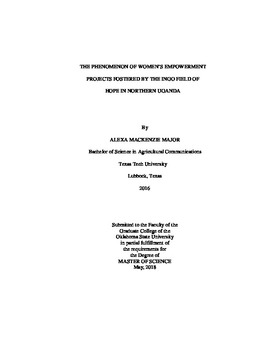| dc.contributor.advisor | Edwards, M. Craig | |
| dc.contributor.author | Major, Alexa Mackenzie | |
| dc.date.accessioned | 2019-05-08T18:36:47Z | |
| dc.date.available | 2019-05-08T18:36:47Z | |
| dc.date.issued | 2018-05-01 | |
| dc.identifier.uri | https://hdl.handle.net/11244/319615 | |
| dc.description.abstract | As poverty remains an issue on a global scale, women across the world continue to be the more marginalized gender. Numerous studies support the role of improved agricultural practices in reducing poverty. A majority of the agricultural labor in lesser developed countries is provided by smallholder women farmers (SHWFs). The United Nations prioritized gender equality and women's empowerment in both the Millennium Development Goals (2000-2015) and the Sustainable Development Goals (2015-2030), and encouraged national governments and other actors, such as International Non-Governmental Organizations (INGOs), to do the same. | |
| dc.description.abstract | However, little qualitative research has been done to study the effectiveness of INGOs regarding women's empowerment through improvements in their agricultural practices, as well as creating access to microfinance opportunities. This phenomenological study was conducted to develop a deeper understanding of the lived experiences of participants in an INGO's women's empowerment program. The study's theoretical perspective included both critical and feminist theories. Twelve SHWFs, beneficiaries of the INGO Field of Hope's projects in northern Uganda, volunteered to participate in semi-structured interviews during August of 2017. Following the interviews, their responses were coded and analyzed to develop five themes and 11 subthemes to understand their experiences and distill the phenomenon's essence. | |
| dc.description.abstract | The emergent themes were securing children's futures through education (one subtheme); empowerment and improved livelihoods as a result of INGO participation (five subthemes); further aspirations for improved quality of life (two subthemes); ongoing challenges (three subthemes); and fear of abandonment by the INGO. The themes were coalesced to create the essence of this phenomenon: Women participants of projects fostered by the NGO Field of Hope in Uganda, although feeling empowered based on increased perceptions of self-esteem, gender equity, sense of community, agricultural knowledge, and economic improvement, still faced ongoing challenges and aspired to further improve their livelihoods. | |
| dc.description.abstract | It is recommended that further research be conducted to assess which INGO practices encourage empowerment over dependency. It is also recommended that investigations occur on whether empowerment projects increase SHWFs' agricultural productivity. INGOs should assume a participatory approach when creating their strategic plans, and network with other development agencies to further assist and empower beneficiaries. | |
| dc.format | application/pdf | |
| dc.language | en_US | |
| dc.rights | Copyright is held by the author who has granted the Oklahoma State University Library the non-exclusive right to share this material in its institutional repository. Contact Digital Library Services at lib-dls@okstate.edu or 405-744-9161 for the permission policy on the use, reproduction or distribution of this material. | |
| dc.title | Phenomenon of Women's Empowerment Projects Fostered by the Ingo Field of Hope in Northern Uganda | |
| dc.contributor.committeeMember | Rastegari-Henneberry, Shida | |
| dc.contributor.committeeMember | Ringer, Joshua | |
| osu.filename | Major_okstate_0664M_15774.pdf | |
| osu.accesstype | Open Access | |
| dc.description.department | International Agriculture | |
| dc.type.genre | Thesis | |
| dc.type.material | Text | |
